Marchés
Lors de la conception d’une intervention humanitaire et de la prise de décisions quant à l’utilisation des transferts monétaires, l’analyse générale des options de réponse doit inclure une analyse de marché. Il est prouvé qu’offrir un soutien ciblant le fonctionnement des marchés accélère la reprise et accroît la résilience dans les zones affectées par une catastrophe.
De nombreuses organisations ont investi dans la mise au point d’outils visant à faciliter l’analyse de marché et réfléchissent à la mise en place de programmes basés sur les marchés plus holistiques. Elles envisagent des interventions tirant profit du marché (basées notamment sur des transferts monétaires aux populations affectées), ainsi que des interventions soutenant directement les marchés (comme l’octroi de subventions conditionnelles aux vendeurs/euses pour la remise en condition du marché).
Initiatives associées
Contenu associé

1.2 Introduction à l’analyse de marché
Cours
Ce cours de 30 minutes offre une introduction à l’analyse de marché pour les contextes d’urgence. Il contient des contributions d'experts dans ce domaine. Ce cours a été développé en collaboration avec l'International Rescue Committee et le CALP Network et grâce au financement d’USAID/OFDA et de l’Agence Suisse pour le Développement et la Coopération. Il est destiné aux...

2.4 Un guide pratique pour l’analyse de marché
Cours
Ce cours en ligne de 3.5 heures vise à fournir aux équipes qui conduiront des analyses de marchés en contextes humanitaires une compréhension approfondie de la théorie et des étapes à suivre afin de leur permettre de comprendre le pourquoi et le comment du processus à suivre. Les participants seront guides à travers un scenario d'analyse de marchés d'urgence. Ce cours s'appuie sur...
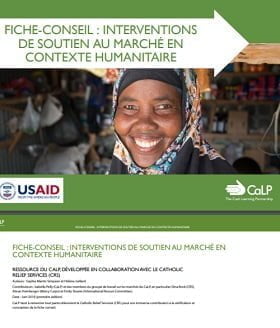
Fiche-Conseil : Interventions de soutien au marché en contexte humanitaire
Guides et outils
La fiche conseil définit le programme de soutien au marché en contexte humanitaire et le décrit dans la pratique. Elle permet aux praticiens humanitaires d’envisager systématiquement des interventions de soutien au marché, parallèlement à d’autres activités du programme. Le champ d’application comprend des interventions de soutien au marché axées sur l’offre/la disponibilité...
Thematic lead
Latest
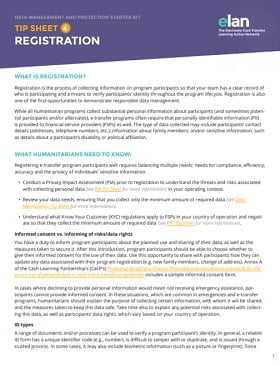
Data management and protection starter kit: Tip sheet 4: Registration
Guidelines and Tools
Registration is the process of collecting information on program participants so that your team has a clear record of who is participating and a means to verify participants’ identity throughout the program lifecycle. Registration is also one of the first opportunities to demonstrate responsible data...

The Impact of Earned and Windfall Cash Transfers on Livelihoods and Conservation in Sierra Leone
Report
This study by Bulte et al. measures the impact of a cash transfer programme aimed at alleviating poverty and reducing pressure on the natural environment in Sierra Leone. Researchers offered aid to 91 rural communities, which are dependent on slash-and-burn agriculture in three forms: as windfall...
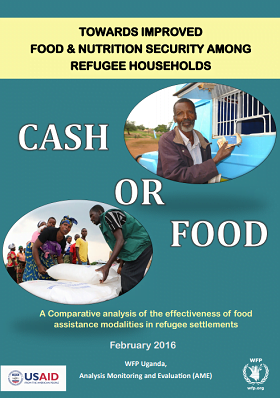
Cash or Food A Comparative analysis of the effectiveness of food assistance modalities in refugee settlements
Report
A comparative analysis on the effective of food and cash transfer modalities for household food security in refugee settlements in Uganda.

ELAN Vocabulary and Usage
Guidelines and Tools
As e-transfer programs, technologies and products develop, key terms, phrases and working definitions are evolving alongside them. At the moment, these words and phrases are rarely standardized, and often hold unique meanings within different contexts and to different stakeholders. In order to facilitate...
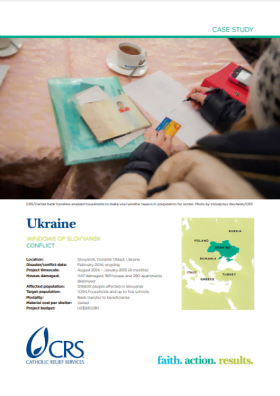
Using Cash for Shelter: Windows of Slovyansk
Case Study
After pro-Russian separatists declared republics in Eastern Ukraine in April 2014, Slovyansk became a focal point of fighting between government forces and rebels until the Ukrainian military retook the city in early July. Slovyansk saw the heaviest fighting of any urban area and many city dwellers fled....
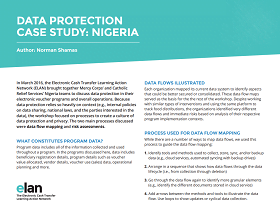
Data Protection Case Study: Nigeria
Report
In March 2016, the Electronic Cash Transfer Learning Action Network (ELAN) brought together Mercy Corps’ and Catholic Relief Services’ Nigeria teams to discuss data protection in their electronic voucher programs and overall operations. Because data protection relies so heaviliy on context (e.g.,...
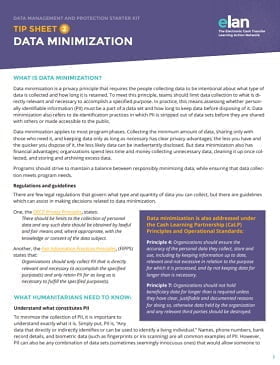
Data management and protection starter kit: Tip sheet 2: Data minimization
Guidelines and Tools
Data minimization is a privacy principle that requires the people collecting data to be intentional about what type of data is collected and how long it is retained. To meet this principle, teams should limit data collection to what is directly relevant and necessary to accomplish a specified purpose. In...
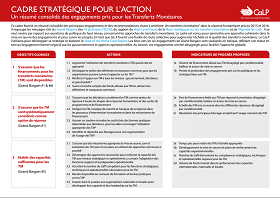
Cadre Strategique Pour L’action
Rapport
Un résumé consolidé des engagements pris pour les Transferts Monétaires
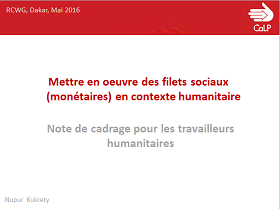
Mettre en oeuvre des filets sociaux (monétaires) en contexte humanitaire
Rapport
Note de cadrage pour les travailleurs humanitaires

What to know: working with humanitarians on e-cash programs
Report
International humanitarian assistance rose to a record US$24.5 billion in 2014. The 2015 Global Humanitarian Assistance Report indicated that over US$200 million of this was used in cash and voucher programs. An increasing number of humanitarian actors have begun to deliver cash electronically, through...

International Cash based assistance
Report
For more than 60 years, the United States provided assistance to food-insecure countries primarily in the form of food commodities procured in the United States and transported overseas. In recent years, the U.S.government has increasingly provided food assistance in the form of cash transfers or food...

Partnering with FSPs to Deliver Cash in Nepal: Top Considerations
Guidelines and Tools
Cash transfers are a proven way to help disaster-affected communities flexibly meet urgent basic needs. Several humanitarian agencies are planning cash transfers to support tens of thousands of Nepali earthquake survivors. While initial responses will likely rely on direct cash in envelopes, cash...
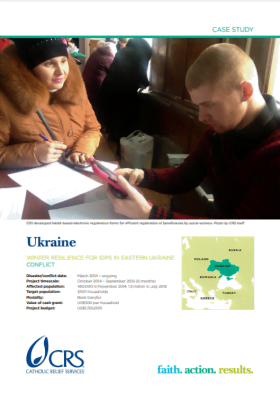
Using Cash for Shelter: Winter Resilience for IDPs in Eastern Ukraine
Case Study
Continued conflict in Eastern Ukraine during 2014 caused internal displacement of over 1.46 million people by September 2015, and another 1,123,800 fled to other countries, according to the United Nations High Commissioner for Refugees. Rapid assessments carried out by Catholic Relief Services found that...
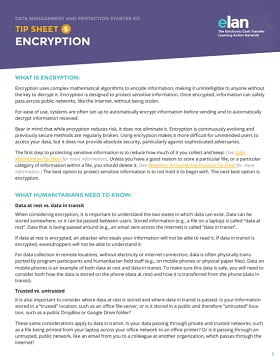
Data management and protection starter kit: Tip sheet 5: Encryption
Guidelines and Tools

What next for CTP?
Report
What next for CWG for 2016? and how to Ensure bangladesh is ready for CTP at scale, at speed and across sectors by 2018? De-Brief and validation Workshop 25 November 2015

Economic Impacts of Humanitarian Aid
Report
Humanitarian aid – whether in-kind or cash transfers – can have a significant economic impact. Potential positive effects include stimulating demand, supporting regeneration of local businesses, job creation and increased tax revenue for governments. Potential negative effects include price inflation,...

When the Money Runs Out Do Cash Transfers Have Sustained Effects on Human Capital Accumulation
Report
This study examines the medium-term effects of a two year cash transfer program targeted to adolescent girls and young women. Significant declines in HIV prevalence, teen pregnancy, and early marriage among recipients of unconditional cash transfers (UCTs) during the program evaporated quickly two...

Cash and Markets In The WASH Sector
Report
Market based programming is increasingly heralded as having a critical place in the future of humanitarian programming. The proposed benefits of working through existing market systems include improvements to speed, efficiency and effectiveness of programming and increased beneficiary dignity and...

Building on social protection systems for effective disaster response: the Philippines experience
Report
How can social protection systems be used in disasters, as a complement to, or substitute for, humanitarian assistance? Oxford Policy Management led a two-year research project investigating this question, looking at the role of social protection in both mitigating the impact of large-scale shocks and...

Giving Better: Lessons from Cash Grants for Syrian Refugees in Lebanon
Report
Cash grants to the poor have proven to be an effective form of aid for reducing poverty. Direct cash assistance is inexpensive to administer and allows recipients to buy what they want and need, rather than what experts think they need. Recent research shows that cash grants also work well for assisting...
